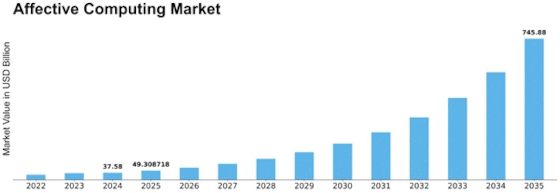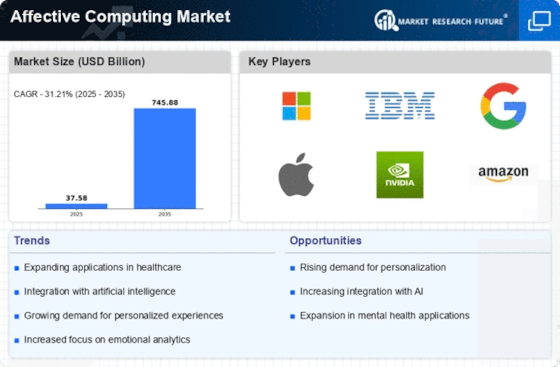Affective Computing Size
Affective Computing Market Growth Projections and Opportunities
Affective Computing Market which is evolving fast with the support of a number of driving factors that mainly guide and overcome the obstacles related to this market. The other phenomenon putting pressure on the split is the increasing desire for a computer to be able to understand people in a more in-depth way in innovation. Clients are increasingly picky about their service, and look for the more individual, personalized experiences, so these firms will be employing affective computing technologies to bubble into their products the ability to understand and answer human feelings. The shift is noticeably manifested is in client support and healthcare area where due awareness can enhance relations and therefore marginally raise satisfaction level of the clients.
Moreover, the fields of artificial intelligence (AI) and man-made brainpower also play a vital role in the creation of the market for emotional computing. These advancements are based on machine learning algorithms which enable the artificial systems to understand and comprehend emotions more intricately and authenticity, in turn, forms strong and dynamic links. The tying in depth computations and neural networks of thought provides a much larger scope for think the feelings technology, thus applying them to be able to learn more and adapt appropriately due in the long run.
The rave of wearable devices is also another great factor making Affective Computing business segment thriving. The advent of smartwatches, wellness trackers and a host of wearables have obviously boosted the means by which we can get real-time health information from our clients. Affective computing innovations can use such information to create life-like events that could be morphed with client’s home state, thereby making their applications more effectual and emotionally connecting with client wellbeing.
Besides, the automated shift move of business at the global level as well increasingly creates an environment for the Affective Computing market. Organizations are beginning to realize the importance of incorporating the ability to learn people behaviour at deep levels into their digital processes in order to engage with their customers at more emotional level. From emotional helpers to internet learning stages, reconciliation of feelings computing using emotions is stepping up to the general customer experience and promotion of customer loyalty, thereby, making the customer sticky.
The humanistic side of decision-making and security considerations also operate as part of shaping the market landscape of Affective Computing. When more and more of these inventions are on the rise, a sense of morality and ethical system is needed by somebody or the federal government to ensure that this technology is used correctly for the benefits of all. Building the coherent relationship of the development and preservative protection of the affective computing market will be a vital step for the supported growth.



















Leave a Comment